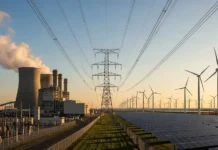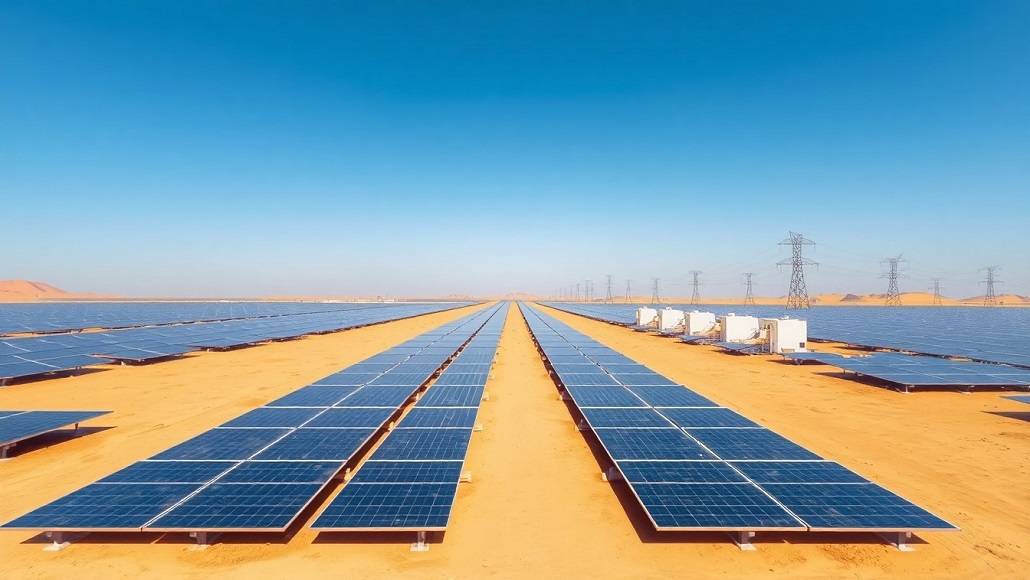Obelisk Solar Power SAE, an Egyptian business owned by Scatec ASA, is getting $479.1 million from the British International Investment (BII), the UK’s development finance institution and impact investor, the African Development Bank, and the European Bank for Development and Reconstruction (EBRD). The money will go towards building a 1 GW solar photovoltaic (PV) power plant with a 200 MWh Battery Energy Storage System (BESS) in the Nagaa Hammadi region of the nation.
The African Development Bank Group says it will cost $184.1 million. $125.5 million of that comes from business loans, $20 million from the Sustainable Energy Fund for Africa (SEFA), and $18.6 million from the Canada-Africa Development Bank Climate Fund, which is a collaboration between the African Development Bank and the Canadian government. The Climate Investment Funds’ Clean Technology Fund will provide another $20 million, which will be transferred via the African Development Bank. The Bank’s Board of Directors agreed to the cash plan on June 11, 2025.
The EBRD will provide a loan package of up to $173.5 million. A European Fund for Sustainable Development (EFSD+) initial loss cover guarantee for the first 18 years will cover US$101.9 million of this amount. The EBRD Shareholder Special Fund will also award a grant of $6.5 million.
The BII finance includes a US$100 million concessional loan and a US$15 million returnable grant. They assist decrease the total cost of the BESS element of the project, which makes it more cheap and possible to pay for. This also gets the commercial sector involved and shows how to invest in the future. There are rules that must be followed before BII’s money may be utilised.
The project is estimated to cost $590 million, and the $475.6 million in blended financing will fund nearly 80% of that.
Scatec, a leading provider of green energy solutions, will develop the combined power plant in two phases. The first portion will feature 561 MW of solar electricity and 100 MW/200 MWh of battery storage. In the first half of 2026, it should start working. The second phase of the 564 MW solar project should start working in the second half of 2026. The Egyptian Electricity Transmission Company will buy the electricity for 25 years via an electricity Purchase Agreement (PPA) in US dollars that is guaranteed by a national pledge.
This will be Egypt’s first project of this magnitude that uses both solar photovoltaics and battery storage when it’s done. It will be a huge step towards the country’s goal of getting more electricity from renewable sources. By 2030, Egypt wants 42% of its electricity to come from renewable sources. The solar power facility is planned to provide roughly 3,000GWh of clean energy to the grid per year. This will help the grid stay stable and manage peak demand. Every year, this will also cut carbon dioxide emissions by up to 1.4 million metric tonnes.
The project will assist Egypt’s energy mix become more varied and increase the proportion of renewable energy. This will help the government reach its decarbonisation targets by lowering greenhouse gas emissions.
Egypt’s Minister of Planning, Economic Development and International Cooperation, Dr. Rania A. Al-Mashat: “The Obelisk Solar Power project represents a landmark in Egypt’s clean energy transition, not only as the first integrated solar and battery storage facility, but also as a model for innovative financing through effective multilateral partnerships. It reflects our continued efforts to scale renewable energy, enhance grid resilience, and drive forward the implementation of Egypt’s Nexus of Water, Food and Energy (NWFE) Country Platform, thus advancing our climate ambitions and creating new opportunities for private sector engagement and sustainable development.”
Wale Shonibare, The African Development Bank’s Director of Energy Financial Solutions, Policy, and Regulations noted: “This project exemplifies the scale of renewable energy potential across Africa and demonstrates how strong partnerships and innovative solutions can advance the energy transition and foster sustainable economic development. It has a high demonstration and replication potential for similar initiatives across the continent.”
Iain Macaulay, Director and Head of Project Finance (Africa & Pakistan), BII said: “This agreement underscores BII’s commitment to innovative and sustainable energy solutions. The integration of battery storage with solar PV is a game-changer for Egypt’s energy sector, providing reliable and dispatchable renewable energy and reducing reliance on fossil fuels. This project not only meets Egypt’s current energy needs but also sets a precedent for future dispatchable hybrid renewable energy projects in the region.”
Boyd Carpenter, EBRD Managing Director for sustainable Infrastructure, said: “We’re delighted to work with our longstanding partners SCATEC, African Development Bank and BII to support this transformative project, which takes Egypt’s green energy transition to another level by harnessing the power of the sun not just during the day but also at night, thanks to the combination of solar and battery storage. It addresses the growing demand for electricity and reduces the need to import expensive fossil fuels. The project contributes towards the goals of the Egypt’s flagship Nexus on Water, Food, and Energy which was launched at COP27 in Sharm El Sheikh, and for which EBRD is Egypt’s lead partner on the energy pillar.”
Stefano Sannino, Director-General of the Directorate-General for the Middle East, North Africa and Gulf of the European Commission said: “Today, the European Union (EU) launches the EU-Egypt Investment Guarantee for Development Mechanism, a strategic platform designed to fast-track a significant pipeline of investment projects to deliver large-scale financing solutions in Egypt. This is a major milestone in the implementation of the EU-Egypt Strategic Partnership. This particular project is a concrete example of a fruitful collaboration between the EU and the EBRD for supporting green transition in the country, through a large-scale investment. The EU guarantee allows the EBRD to provide a loan alongside other financiers to finance an innovative integrated solution which can attract private investors.”
Terje Pilskog, CEO of Scatec, the project’s operation and maintenance contractor, said: This project marks a major milestone for Scatec. It proves our ability to deliver large-scale hybrid projects. We are proud to partner with leading development finance institutions to support Egypt’s clean energy ambitions, and we look forward to delivering this important project together with our partners.










































